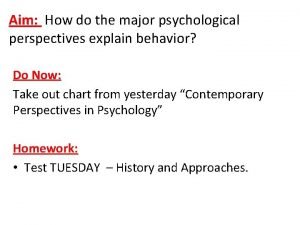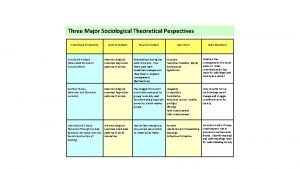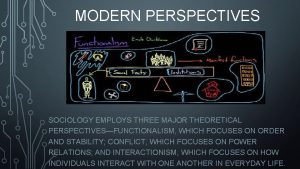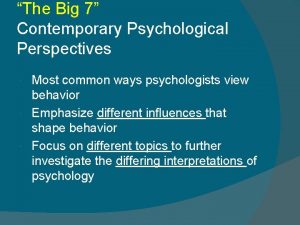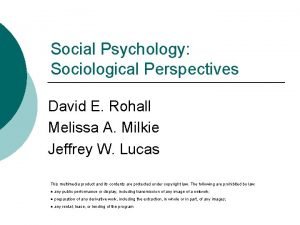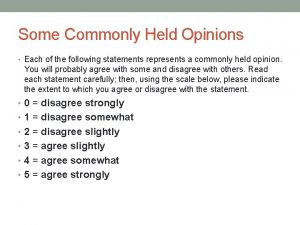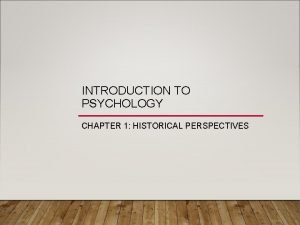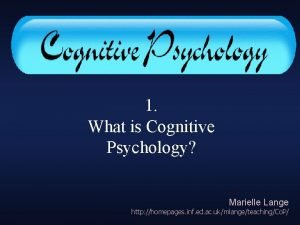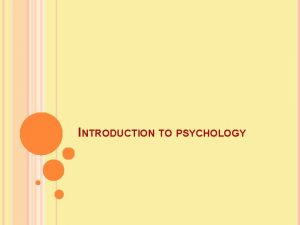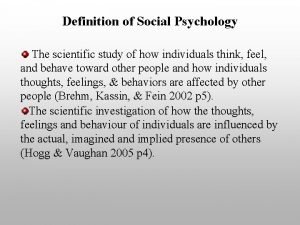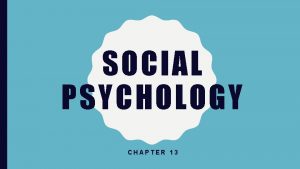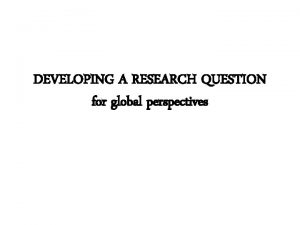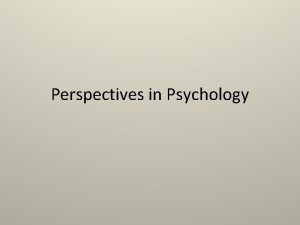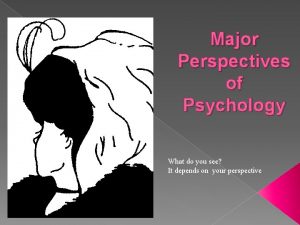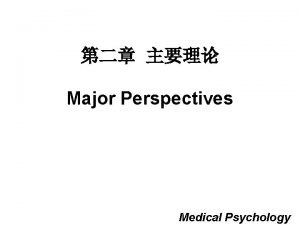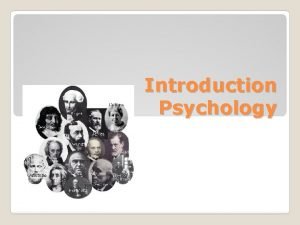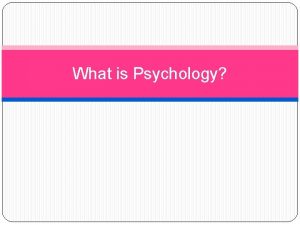Major Perspectives of Psychology Perspectives n n n




























- Slides: 28

Major Perspectives of Psychology.

Perspectives n n n Psychoanalytic Behaviorism Humanism Cognitive Evolutionary Biological/Biomedical

Psychodynamic n The psychodynamic perspective originated with the work of Sigmund Freud. This perspective emphasizes the role of the unconscious mind, early childhood experiences, and interpersonal relationships to explain human behavior and to treat people suffering from mental illnesses.

Psychoanalysis n n Psychoanalysis is the form of treating psychological disorders, invented by Freud. It is famous for the couch.

Psychoanalysis summary n n All methods deal with accessing the unconscious mind Psychoanalysis is therapist-centered, meaning therapist has all the answers, not the patient.

Criticisms of Freud’s theory: n n 1. Freud had no scientific data to support his theories. 2. Freud’s theories (unconscious, libido, etc. ) cannot be observed. 3. Theory explains behavior (post-hoc) after the fact. 4. Observations not representative of population (very sexist and not multicultural).

Pros of Freud’s theory n n n 1. Argued that childhood experiences are important in personality development. 2. Information outside of awareness does influence us. 3. Defense mechanisms—good descriptions of some of our behaviors.

Behaviorism

Behaviorism n n By the 1950 s, Psychoanalysis seemed very unscientific. Behaviorists will bring science back into psychology, even if they overdo it a little. Behaviorism is NOT interested in the unconscious mind since it cannot be observed in a laboratory.

Very telling quote!! n Give me a dozen healthy infants, well-formed, and my own specified world to bring them up in and I’ll guarantee to take any one at random and train him to become any type of specialist I might select -- doctor, lawyer, artist, merchantchief and, yes, even beggar-man and thief, regardless of his talents, penchants, tendencies, abilities, vocations, and race of his ancestors. --John Watson, Behaviorism, 1930

Ivan Pavlov n He was not a psychologist but a Russian physiologist. He discovered classical conditioning. Classical conditioning is Associative learning. He trained a dog to drool to a bell.

B. F. Skinner n B. F. Skinner is the most famous of the Behaviorists. He is famous for operant conditioning. Operant conditioning (aka shaping) is learning through reinforcements (rewards) and punishments.

Behaviorism n Albert Bandura did a famous experiment that said our behavior does not have to be classically conditioned or operant conditioned. We can simply observe behavior and copy it.

Behavioral Therapy n n Focuses on maladaptive behaviors (mal means bad) and changing them. Token economy uses positive reinforcement to get large groups of students or mental ward patients or employees to do something like clean up or attend group therapy. (ex: pizza party if you all pass your test)

Behaviorism Summary n n Behaviorism says we do what we do because of classical conditioning, operant conditioning or we simply learn the behavior from watching or copying it. In its extreme, they think we are simply rats in a cage pressing buttons. WE HAVE NO FREE WILL!

Humanism

Humanistic n n Humanism came about in the 1960 s in reaction to psychoanalysis and behaviorism. Humanistic psychology was instead focused on each individual’s potential and stressed the importance of growth and selfactualization. The fundamental belief of humanistic psychology was that people are innately good. We are not rats in a cage! We are not id -driven animals! We are humans with free will.

Humanism n Carl Rogers revolutionized talk therapy. His therapy is client-centered, where the client has all the answers instead of therapist. Therapists treat the client with unconditional positive regard (no judgments). Group therapy comes from Humanism.

Humanism summary n n Humanists are really touchy-feely, but without them we are just rats in a cage. Rogers and Maslow put the “human” element back into psychology and therapy. Their philosophy: We are all humans striving to maximize our potential. A therapist’s job is to remove obstacles to self-actualization. Positive psychology comes from Humanism

Cognitive Psychology

Cognitive Perspective n n n What does the word cognitive mean? How about cognition? Recognition? It is the study of how people perceive, remember, think, speak, and solve problems. Cognitive therapy is about changing the maladaptive thoughts of a person.

Cognitive perspective on depression n We are depressed because we are irrational. Our expectations are too high and misplaced. We want everyone to love us and accept us. We want every thing to go our way. We stay angry about stuff that happened a looong time ago. WE MUST CHANGE THE WAY WE THINK TO BE HAPPY AND SUCCESSFUL.

Cognitive Therapy n Cognitive therapy is about changing the maladaptive (bad) thoughts. Albert Ellis, Aaron Beck and William Glasser are famous for reality therapy. They challenged his patients to ask, “Are my thoughts realistic or rational? ” Cognitive therapy also “educates” the client, teaches him/her proper behaviors/thoughts

Evolutionary Psychology n Evolutionary psychology examines psychological traits — such as memory, perception, or language — from a modern evolutionary perspective. It seeks to identify which human psychological traits are evolved adaptations, that is, the functional products of natural selection or sexual selection

Evolutionary Psychology n This branch explains why humans do what they do in terms of adaptive value (survival of the species).

Evolutionary Psychology n n n Why do women spend so much money on a weekly basis but men will surprise their wives with a brand new car (without asking her)? Evolutionary psychologists try to explain this behavior with comparisons to hunter-gather cultures. Why do women have more bug phobias?

Biological Perspective n This perspective is among the most respected right now. They focus on our brain, nervous system, neurotransmitters and hormones to explain our behaviors.

Common medicines n n n Prozac – antidepressant – blocks reuptake of serotonin. Xanax – anti-anxiety (side effect of drowsiness) Lithium-treats bipolar disorder
 7 major perspectives in psychology
7 major perspectives in psychology Major perspectives in psychology
Major perspectives in psychology Four major perspectives of psychology
Four major perspectives of psychology The outrageous celebrity psychology
The outrageous celebrity psychology Three major sociological perspectives
Three major sociological perspectives Three major theoretical perspectives in sociology
Three major theoretical perspectives in sociology 7 perspectives of psychology
7 perspectives of psychology Psychology perspectives
Psychology perspectives What is contemporary perspective
What is contemporary perspective Seven approaches to psychology
Seven approaches to psychology Social psychology sociological perspectives
Social psychology sociological perspectives Hand mnemonic for the 7 perspectives of psychology
Hand mnemonic for the 7 perspectives of psychology Historical perspectives of psychology
Historical perspectives of psychology 7 perspectives of psychology
7 perspectives of psychology 5 major domains of psychology
5 major domains of psychology Major schools of thought in psychology
Major schools of thought in psychology 5 major domains of psychology
5 major domains of psychology Csulb psychology major requirements
Csulb psychology major requirements Areas of psychology
Areas of psychology Psb ucf
Psb ucf Towson university phd programs
Towson university phd programs Social psychology ap psychology
Social psychology ap psychology Pure psychology
Pure psychology Positive psychology ap psychology definition
Positive psychology ap psychology definition Social psychology is the scientific study of
Social psychology is the scientific study of Psychology experiment
Psychology experiment Health psychology definition ap psychology
Health psychology definition ap psychology Good research questions for global perspectives
Good research questions for global perspectives Social functionalism examples
Social functionalism examples



